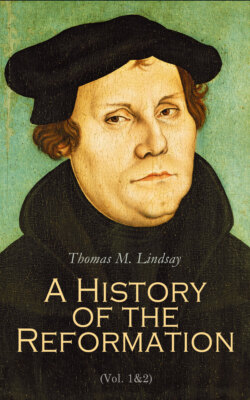Читать книгу A History of the Reformation (Vol. 1&2) - Thomas M. Lindsay - Страница 8
На сайте Литреса книга снята с продажи.
§ 2. The Temporal Supremacy.
ОглавлениеTable of Contents
The former, stated in its widest extent, was the right to depose kings, free their subjects from their allegiance, and bestow their territories on another. It could only be enforced when the Pope found a stronger potentate willing to carry out his orders, and was naturally but rarely exercised. Two instances, however, occurred not long before the Reformation. George Podiebrod, the King of Bohemia, offended the Bishop of Rome by insisting that the Roman See should keep the bargain made with his Hussite subjects at the Council of Basel. He was summoned to Rome to be tried as a heretic by Pope Pius ii. in 1464, and by Pope Paul ii. in 1465, and was declared by the latter to be deposed; his subjects were released from their allegiance, and his kingdom was offered to Matthias Corvinus, the King of Hungary, who gladly accepted the offer, and a protracted and bloody war was the consequence. Later still, in 1511, Pope Julius ii. excommunicated the King of Navarre, and empowered any neighbouring king to seize his dominions—an offer readily accepted by Ferdinand of Aragon.8
It was generally, however, in more indirect ways that this claim to temporal supremacy, i.e. to direct the policy, and to be the final arbiter in the actions of temporal sovereigns, made itself felt. A great potentate, placed over the loosely formed kingdoms of the Middle Ages, hesitated to provoke a contest with an authority which was able to give religious sanction to the rebellion of powerful feudal nobles seeking a legitimate pretext for defying him, or which could deprive his subjects of the external consolations of religion by laying the whole or part of his dominions under an interdict. We are not to suppose that the exercise of this claim of temporal supremacy was always an evil thing. Time after time the actions and interference of right-minded Popes proved that the temporal supremacy of the Bishop of Rome meant that moral considerations must have due weight attached to them in the international affairs of Europe; and this fact, recognised and felt, accounted largely for much of the practical acquiescence in the papal claims. But from the time when the Papacy became, on its temporal side, an Italian power, and when its international policy had for its chief motive to increase the political prestige of the Bishop of Rome within the Italian peninsula, the moral standard of the papal court was hopelessly lowered, and it no longer had even the semblance of representing morality in the international affairs of Europe. The change may be roughly dated from the pontificate of Pope Sixtus iv. (1471–1484), or from the birth of Luther (November 10th, 1483). The possession of the Papacy gave this advantage to Sixtus over his contemporaries in Italy, that he “was relieved of all ordinary considerations of decency, consistency, or prudence, because his position as Pope saved him from serious disaster.” The divine authority, assumed by the Popes as the representatives of Christ upon earth, meant for Sixtus and his immediate successors that they were above the requirements of common morality, and had the right for themselves or for their allies to break the most solemn treaties when it suited their shifting policy.
